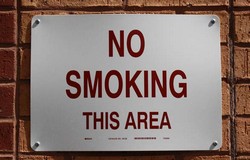New Jersey Governor Phil Murphy signed three different bills in order to legalize and regulate the use and consumption of recreational marijuana, fulfilling one of his early on campaign promises on Monday, Feb. 22.
However, legalization within the state does not necessarily mean legalization within college campuses. Many higher education institutions in legal states have battled between federal and state laws as marijuana remains federally illegal. The same applies to Monmouth University.
Mary Anne Nagy, Vice President for Student Life and Leadership Engagement, sent an email to the campus community explaining the new laws’ implications on the University on Thursday, Mar. 18. The message stated that even though marijuana may be legalized, the possession or use of it is still not permitted on school grounds.
 This is partly due to the fact that Monmouth University, and all higher education schools, must abide by the Federal Safe and Drug-Free Schools and Communities Act, Nagy wrote. The DFSCA was passed by Former President George H. W. Bush in 1989, where it allowed institutions to receive federal funding as long as they enforced a drug program or protocol within their campus.
This is partly due to the fact that Monmouth University, and all higher education schools, must abide by the Federal Safe and Drug-Free Schools and Communities Act, Nagy wrote. The DFSCA was passed by Former President George H. W. Bush in 1989, where it allowed institutions to receive federal funding as long as they enforced a drug program or protocol within their campus.
This funding helps with federal work study programs, Stafford loans and any type of financial aid that might be beneficial to the students.
Additionally, when the laws were passed within New Jersey, it specified that the consumption of marijuana would not be permitted within “any public or private institution of higher education or a related entity thereof, regardless of whether the area or facility is an indoor place or is outdoors,” the message continued.
Now, on-campus police must handle any marijuana condition similar to any other police officer within the state. Dean A. Volpe, Captain of the Monmouth University Police Department, specified that on-campus officers must follow the New Jersey Attorney General guidelines with regard to the recent changes to the marijuana laws. The Department of Law and Public Safety of the State of New Jersey specified that the new laws create “more lenient penalties for possession and distribution that remain tiered based on weight.”
However, Nagy explained that regardless of how the police handle the situation, the students must still follow the guidelines that are within the student code of conduct. She clarified that on a federal level, marijuana is classified as a class 1 substance, but even without that, NJ and the university itself would still prohibit the use of cannabis on campus.
The student handbook states that during a student’s first offense of any use, possession or in the presence of a controlled substance, they will have “residence hall probation, up to a $200 fine, possible service work assignment, disciplinary probation for one full semester, possible educational program, a mandatory meeting with Monmouth University’s Substance Awareness Coordinator, and parental notification.”
During a student’s second offense, the handbook continues to explain that this would grant a student suspension from the University for the minimum of one semester, a fine of $400, and permanent loss of University housing privileges. A third offense would include expulsion from the University.
“We believe that marijuana is problematic for students in so many ways. It affects your lungs, and we know that there are other implications from a health perspective. So, we have made the decision that we are not changing our alcohol or drug policy, even though the state will allow you,” said Nagy.
Within the Monmouth University student handbook, under health risks of certain substances, it explains some of the health risks associated with marijuana. Short term effects may include “distortion of time perception, increased heart rate, dilation of the blood vessels, and loss of short-term memory,” with long-term effects being “loss of motivation, chronic bronchitis, decreased lung capacity, and an increased risk of lung cancer.”
The same rules have been applied to Universities in other legal states, such as California, who had decriminalized marijuana in 1996 and made it recreational in 2016. For example, in US San Diego, “UC students and employees who violate the University’s policy may face discipline, with a maximum penalty of dismissal,” according to a November 2016 statement.
The bill was introduced after New Jersey voters were asked to vote on the proposition during the November general election. With 67 percent of the voters agreeing, NJ has become the 13th state to legalize marijuana and only the 3rd state on the east coast.
Within these bills, the use of cannabis has been legalized for adults over the age of 21, as well as new regulations for sentencing and underage becoming established. Citizens over the age of 21 are allowed to legally possess up to six ounces of marijuana, and mandatory minimum sentences for all non-violent offenses was eliminated.
One of the bills also reduces the punishment for underage possession of both cannabis and alcohol, in which the governor and others hope will be an effort in addressing racial injustice. Underage possession of either are cited as written warnings, which include parental notification and might include referral to community services after multiple citations.
“Our current marijuana prohibition laws have failed every test of social justice, which is why for years I’ve strongly supported the legalization of adult-use cannabis. Maintaining a status quo that allows tens of thousands, disproportionately people of color, to be arrested in New Jersey each year for low-level drug offenses is unjust and indefensible,” said Governor Murphy.
Eleanor Novek, Ph.D., Professor of Communication, agrees that there are problems within the legal system that disproportionally affect people of color. “For many years, communities of color have been disproportionately targeted by law enforcement, and that practice is still going on.”
She believes that legalization is important in helping out with these issues, but there should be other laws in place to help with racial disparities. “People who were previously convicted of possessing or selling what are now legal amounts of marijuana still have criminal records, which can make it harder for them to find jobs or housing, and more difficult to stay out of prison if they have future arrests.”
She continues to state that, in a recent report by the American Civil Liberties Union, “drug-related violations were the most frequent cause for arrest in the United States in 2018, with nearly 40 percent of those arrests for marijuana.”
Although Gov. Murphy promised to move forward with the legalization of cannabis in 2017 during his political campaign, NJ continued to have more arrests of marijuana related crimes than any other state. That same year, the police arrested 34,501 residents for possession and 3,122 people for selling, according to FBI data.
However, for now it does not seem like there will be any upcoming changes on campus in regards of marijuana. When asked if in the future, Monmouth would look towards allowing the use of cannabis on campus, Nagy said, “I think the greatest impediment to a student’s degree is the use of substances. Past experiences and science tell us that it can be harmful and hurtful and right now I don’t foresee any changes in the University’s position.”
She continued, “If people chose to smoke marijuana legally, when all the regulations are set and you are over the age of 21, that is your choice, you just can’t do it on campus.”
PHOTO COURTESY of Anthony DePrimo
IMAGE TAKEN from Wikimedia Commons




